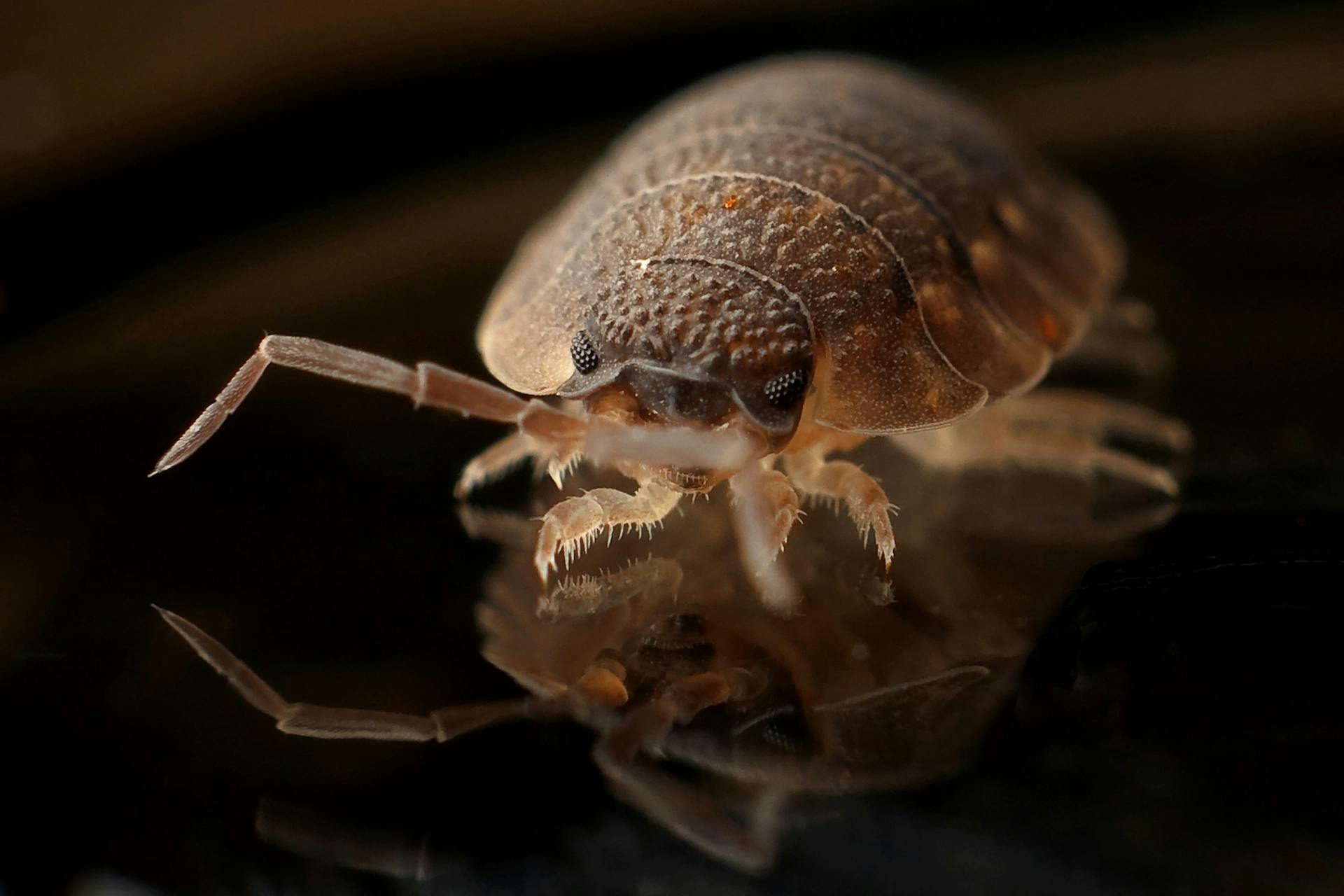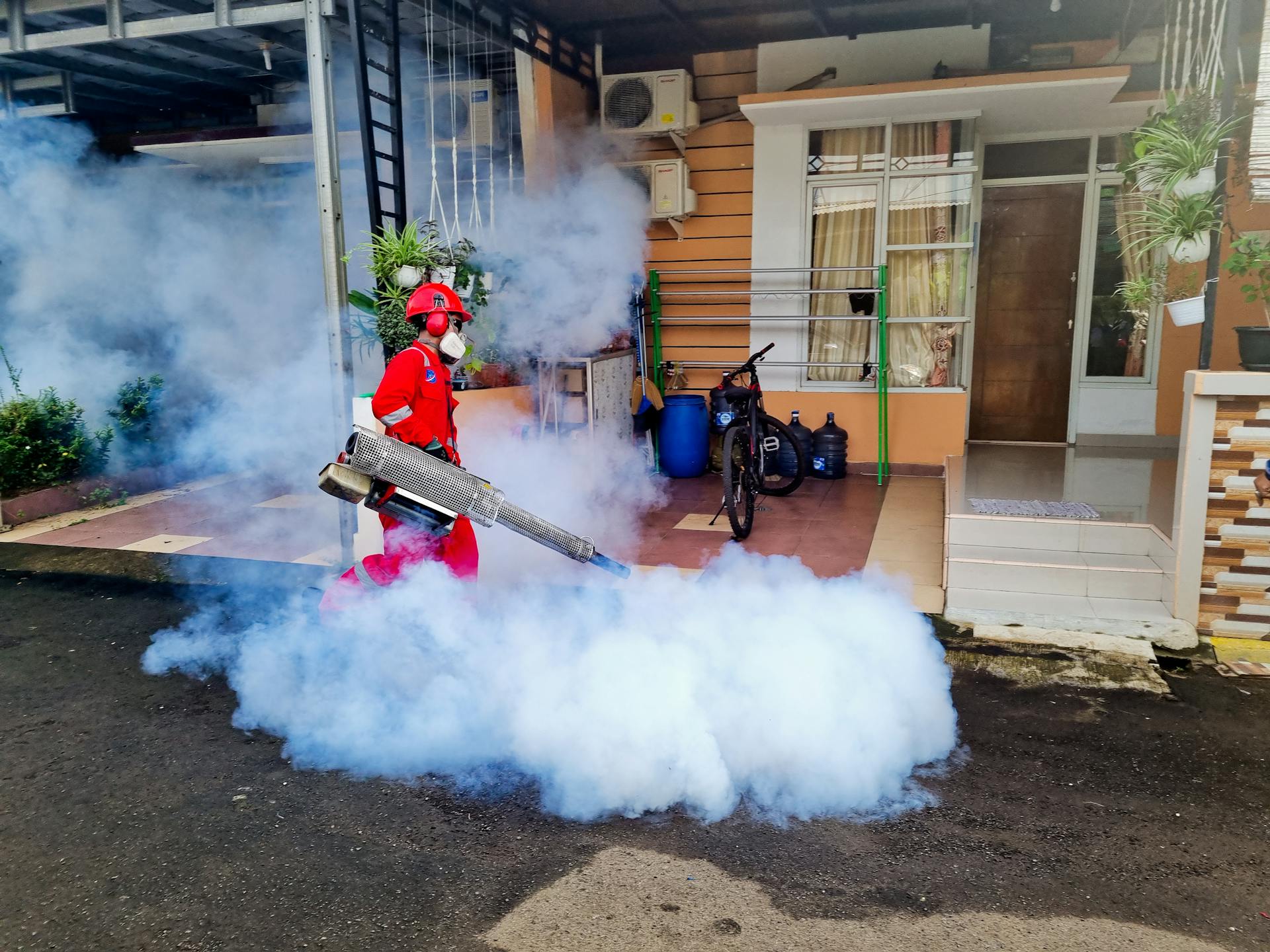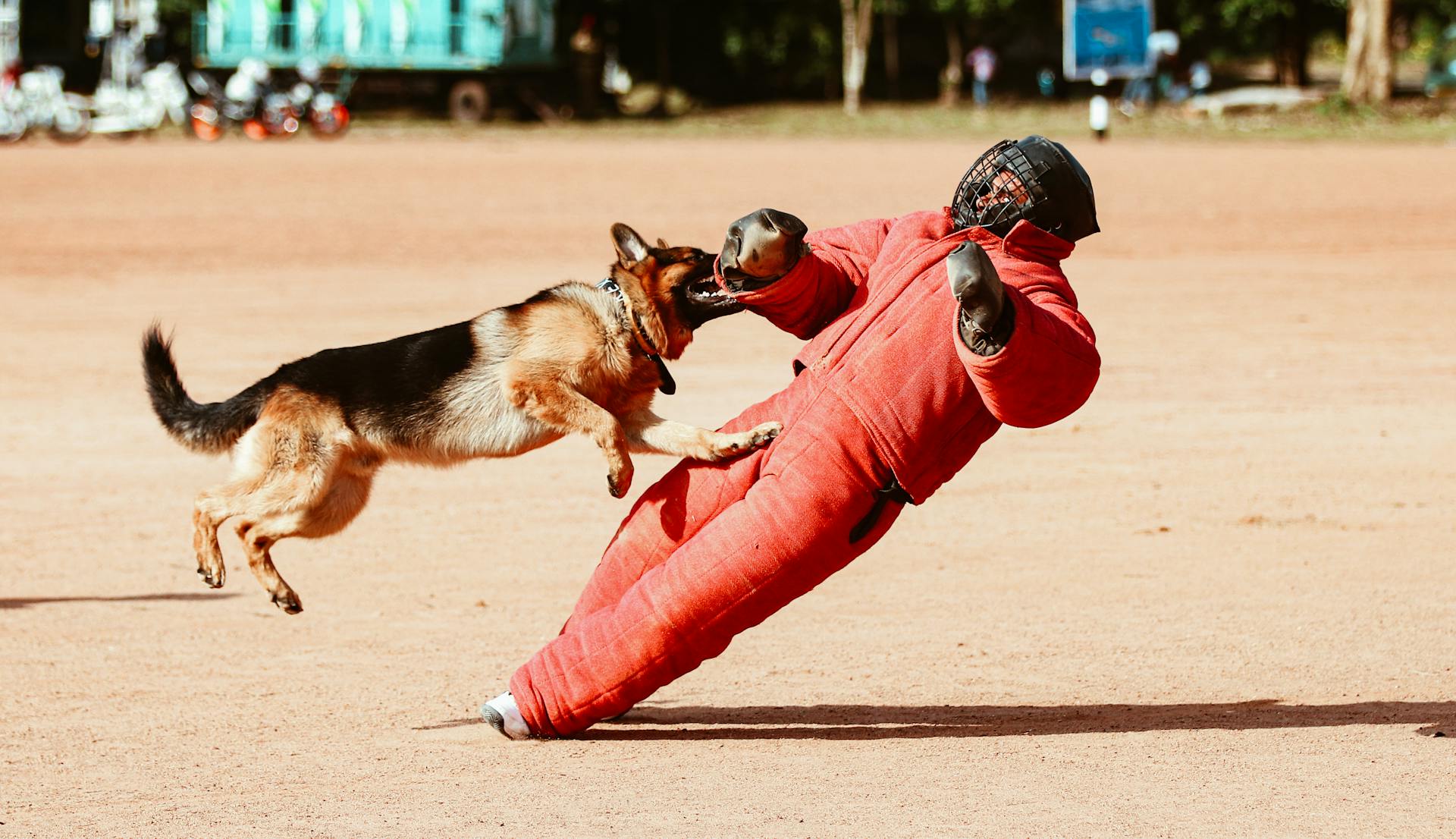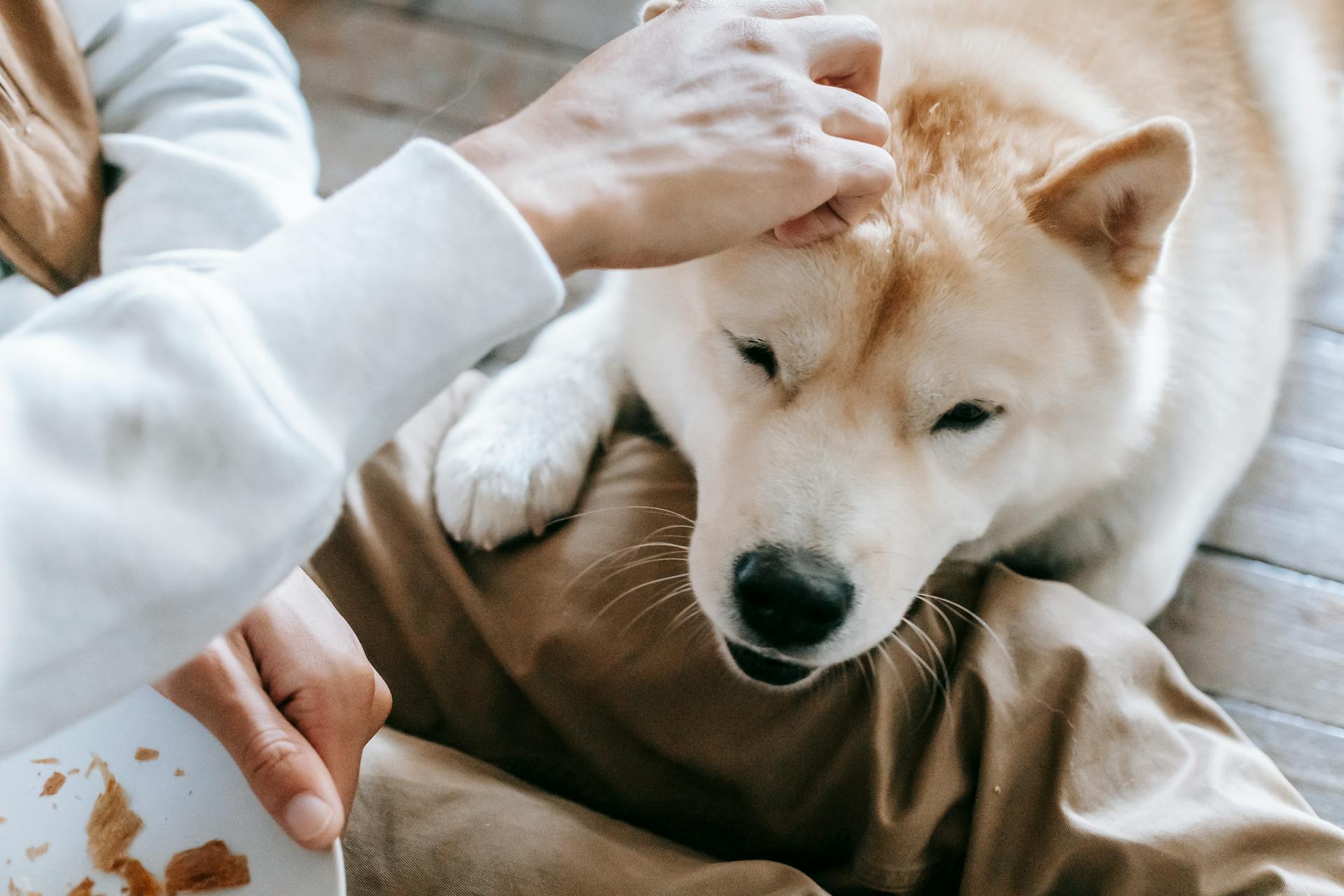
Bed bugs are a common pest that can infest homes, and pet owners often worry about whether they can harm their furry friends. Bed bugs can infest any home, regardless of cleanliness.
Bed bugs are attracted to the warmth and carbon dioxide of mammals, including dogs. This means that dogs can be a potential target for bed bugs.
While bed bugs can bite dogs, they don't typically transmit diseases to them. However, bed bug bites can still cause discomfort and allergic reactions in dogs.
Bed bugs are most active at night, which is when they're most likely to encounter dogs sleeping in their beds.
Suggestion: Dog Bed for Bernese Mountain Dog
Pet Safety and Health
Bed bugs are notorious for infesting homes and causing discomfort for their human hosts, but can they also attack dogs? The answer is yes, but it's relatively rare.
Bed bugs are more interested in humans than animals, but they can bite dogs if they get the chance. If your dog starts showing signs of bed bug bites, such as small red marks on their stomachs, usually in straight lines, it's essential to inspect their bedding and other areas for shed bed bug exoskeletons or live insects.
Recommended read: Flea Bed on Dog
If you suspect bed bugs are infesting your home, it's best to call an exterminator to quickly get rid of the infestation. Bed bugs can be tough to eliminate, and their presence can cause stress and discomfort for your dog.
Bed bugs can weaken a dog's immune system by causing chronic stress, making them more susceptible to infections and other health issues. Continuous scratching and biting at the irritated areas can lead to open wounds, increasing the risk of secondary skin infections.
Some dogs may develop allergic reactions to bed bug bites, resulting in more severe redness, swelling, or itching. If you notice any unusual reactions, consult your veterinarian for advice.
Here are some signs that your dog may have bed bugs:
- Small red marks on their stomachs, usually in straight lines
- Itching and scratching
- Shed bed bug exoskeletons or live insects in their bedding or other areas
- Bed bug droppings or bloodstains on bedding
If you suspect bed bugs are infesting your home, take the following steps to protect your dog:
- Wash your dog's bed and blankets in hot water and dry them on high heat
- Inspect your dog's fur regularly for signs of bed bugs
- Check their bedding and other areas for shed bed bug exoskeletons or live insects
- Call an exterminator to get rid of the infestation
Treating and Preventing
Bed bugs are tough parasites, so not all insecticides will kill them. Always read the packaging or container to see if bed bugs are specifically mentioned, and assume the product is not effective if they are not.
Explore further: My Dogs Not Eating
To treat bed bugs on your dog's bed, wash your dog's bed and blankets, and treat their bed but ventilate it well before allowing the dog to use it again. This includes treating the mattresses and human bedding.
Treatment for bed bug bites on dogs focuses on relieving itching and discomfort, which may include topical creams or antihistamines, but always consult your veterinarian before applying any medication.
Curious to learn more? Check out: What to Do with Your Dog's Ashes?
Can Bite?
Bed bugs can bite dogs if they are accessible. They prefer human hosts, but they don't hesitate to feed on dogs when humans are not available.
In fact, bed bugs can survive up to a year without a human host, which means they'll look for alternative sources of blood if they can't find a human.
If you have a dog and you suspect you have bed bugs, it's essential to act quickly to prevent them from biting your pet.
Bed bugs can bite cats too, so it's not just dogs that are at risk.
Suggestion: Dog Bite
Treating Dog Infestation
If you suspect your dog has bed bugs, it's essential to take action quickly. You can treat your dog's bed and blankets by washing them in hot water and drying them on the highest dryer setting.
Bed bugs are notoriously tough parasites, and not all insecticides will kill them. Always read the packaging or container to see if bed bugs are specifically mentioned, as the average bug bombs sold for flea control in the home are usually ineffective against bed bugs.
To effectively eliminate bed bugs, treat the mattresses and human bedding. You can also use the Environmental Protection Agency's product checker to see what works and what doesn't against bed bugs.
If you find bed bugs in your pet's sleeping area, immediately wash their bedding in hot water and dry it on the highest dryer setting. Vacuum the area thoroughly to help eliminate any remaining bed bugs.
Treatment for bed bug bites on dogs is generally focused on relieving itching and discomfort, and may include topical creams or antihistamines. However, always consult your veterinarian before applying any medication.
Here's an interesting read: Types of Dog Bugs
To Mitigate These Effects

To mitigate the effects of bed bug bites on your dog, it's essential to take a comprehensive approach. Promptly addressing the infestation is crucial, and professional pest control services are often necessary to ensure complete eradication.
Wash your dog's bed and blankets to get rid of any bed bugs that may have infested them.
Regular veterinary check-ups are vital to catch any signs of skin infections, allergic reactions, or behavioral changes early on.
Providing a stress-free and comfortable environment for your dog can help alleviate anxiety, and ensuring a safe, clean, and quiet resting area is key.
In cases of significant behavioral changes, consulting with a veterinary behaviorist or a professional dog trainer may be beneficial to help your dog readjust and cope with the stress.
Bed bugs are tough parasites, and not all insecticides will kill them, so it's essential to use a product that specifically targets bed bugs.
Understanding Bed Bugs and Pets
Bed bugs are notorious for targeting humans, but they can also bite pets, although it's rare. Bed bugs have very little interest in animals, preferring human hosts.
Excessive itching will likely be the first indicator that something's up, and you might also see small reddened dots in a group, as well as translucent shed exoskeletons, black spots that smear when cleaned, or bloodstains on bedding.
Bed bugs will crawl into your pet's fur, especially if they sleep in the same bed as you, and hide away during the day, building their new colony.
What Pets Look Like
Bed bug bites on pets can be tricky to spot, but there are some telltale signs to look out for. Excessive itching is often the first indicator that something's up.
Dogs may experience redness, itching, and swelling at the bite sites, similar to humans. These symptoms can lead to excessive scratching and biting at the affected areas, causing further skin irritation or even secondary skin infections.
You might also see some suspicious translucent shed exoskeletons laying around, along with black spots that smear when you try to clean them (bed bug droppings) or bloodstains on bedding. These signs can indicate a bed bug infestation.
In cases of severe infestation, where a large number of bed bugs feed on a single animal, there is a risk of anemia, particularly in smaller or younger dogs.
Check this out: Bug Zapper
The Canine Connection
Dogs have a keen sense of smell that can help detect bed bug infestations with remarkable accuracy.
Trained dogs can be an integral part of bed bug detection, but their success rates vary and require proper training and human verification.
Bed bug bites on dogs can lead to skin irritation, characterized by redness, itching, and swelling at the bite sites.
Excessive scratching and biting at the affected areas can cause further skin irritation or even secondary skin infections.
In severe cases, bed bug infestations can cause anemia in dogs, particularly in smaller or younger dogs, manifesting as lethargy, weakness, and in severe cases, can be life-threatening.
Detecting bed bug bites on dogs can be more challenging due to their dense fur, which can hide the bites and delay recognition of an infestation.
Pet owners need to be observant of their dog's behavior and physical condition, especially if bed bugs are known or suspected in the home.
If a dog is bitten by bed bugs, veterinarians may recommend topical treatments such as medicated shampoos or ointments to soothe the skin, and in severe reactions, oral medications like antihistamines or steroids may be prescribed.
Take a look at this: Dog Bites
Featured Images: pexels.com


